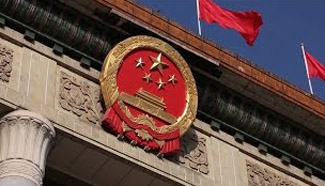VIENNA, March 14 (Xinhua) -- The legalization of some narcotics is not considered and the narcotic threat is a very dangerous problem, chief of the Shanghai Cooperation Organization (SCO) told Xinhua in an interview on Tuesday.
"We are not thinking about legalizing some narcotics," said SCO Secretary-General Rashid Alimov.
Alimov was attending the 60th session of the Commission on Narcotic Drugs (CND) in the capital of Austria, as SCO seeks to strength cooperation with UN Office on Drug and Crime(UNODC) over the drug issue.
The SCO is an inter-governmental organization founded in Shanghai in 2001, including China, Kazakhstan, Kyrgyzstan, Russia, Tajikistan and Uzbekistan.
Alimov noted that all countries without exception have felt the destructive effects of the narcotic drug pandemic, and it is a great threat to international security and sustainable development.
"The alarming growth of the drug business and drug abuse in recent years has deeply affected all areas of life in all nations, undermining government institutions and social foundations and delivering a highly destructive blow to the nations' gene pool," he said.
Alimov told Xinhua that the SCO plays an important role in fighting against illicit narcotic drugs.
"Fight against illicit traffic in narcotic drugs has been a priority for the Shanghai Cooperation Organization since its establishment. The SCO member states pay a lot of attention to this issue, and can be often heard expressing concerns over narcotic threat exacerbation," he said.
The SCO chief said during SCO summits, leaders of member states reiterate the need to step up international cooperation in this area.
Leaders of member states also reaffirmed SCO's commitment to maintaining and strengthening the existing international framework for drug control based on three main international drug control conventions of the UN.
The SCO has an efficient three-level institutional mechanism for the interaction of the member states' counternarcotic agencies, which is facilitating interaction in dealing with outstanding issues at the expert and executive levels.
Alimov said the SCO made some achievements in the war against illicit drug, since the SCO has comprehensive Anti-narcotics Strategy adopted in 2011 and its Action Plan.
During the period from 2011 to the first half of 2016, counternarcotic agencies of the SCO member states confiscated some 69 tonnes of heroin, over 17 tonnes of raw opium, over 349 tonnes of marijuana and 28 tonnes of hashish, according to Alimov.
"The quantity of heroin they confiscate amounts to 14 percent of global heroin seizure. Experts will tell you that this means millions of saved lives, the loss of billions of U.S. dollars in drug barons' revenue and a heavy blow to the drug crime," he said.
According to Alimov, the high-level event titled "the United Nations and the Shanghai Cooperation Organization in the fight against drugs: common threats and joint actions" was successfully held, which was a success within the cooperation with UN.
"This joint event became a milestone in SCO's cooperation with the UNODC, and raised awareness among target audiences and the public at large on the dedicated and consistent efforts by the two organizations in fighting the drug problem," he said.
"Cooperation with the UN is a priority for us. It is a great example of equal and mutually beneficial partnership between a global organization and a regional one. We will continue our joint efforts," Alimov added.












